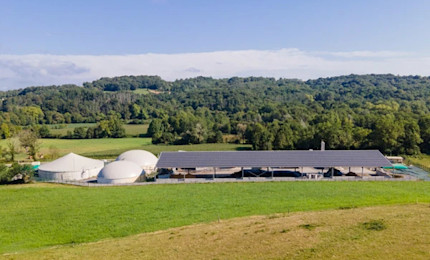Urgence gaz 0 800 028 800

Methanisation project: Teréga accompanies you at every stage
Do you want to contribute to the energy transition by turning your organic waste into biomethane? Teréga helps you develop your methanisation project, from the original study to injection into the gas grids. Our teams are attentive to your needs and provide support to you throughout the key stages of your biomethane project.
How to prepare your methanisation project properly?
The first stage of your biomethane production project is to check the eligibility of your future facility, both in terms of production capacity and location. These 2 pieces of information are necessary to carry out the feasibility studies.
Simulate your biomethane production capacity
Biomethane is a green gas produced from organic matter. Depending on the waste you intend to use as inputs (agricultural, food industry or household waste, sewage sludge, etc.) and its quantity, you will be able to produce more or less biomethane. These organic materials each have a different methanogenic potential.
Teréga provides a simulator that allows you to estimate your biomethane production capacity according to the quantity of your different inputs.
Locate your methanisation project
The feasibility of your project also depends on the distance between your methanisation site and the gas grid. Indeed, your facility will need to be connected for the biomethane to be injected into the gas grids. Depending on where you plan to set up your methanisation unit, more or less significant network adaptation work will have to be planned by your local grid operators.
The gas operators have drawn up a grid map to allow biomethane project holders in France to visualise those areas most favourable for injection. The purpose of this map is to encourage the injection of biomethane into the grids, but it is only an indicator. Whether you are located in a more or less favourable area, only the feasibility studies will validate or otherwise implementation of your methanisation project.
Make your methanisation project a reality with Teréga
Have you determined the location of your site and its biomethane production capacity? Contact us so we can study and make your methanisation project a reality!
How will we support you? Before the final injection phase in our gas grid, four essential stages are necessary to be able to put a methanisation project into service:
This free of charge and non-binding study is based on an expression of needs document (completed by the project leader) including the technical data needed for calculations (injection flow, location of the injection site etc.)
That investigation makes it possible to:
validate, in principle, the technical feasibility of the injection connection to the grid ;
establish preliminary budget figures for the connection, enabling the project leader to consolidate the business plan they have worked out with their engineering department ;
set out a preliminary schedule for the connection .
This preliminary study takes less than a month.
Once a feasibility study agreement has been signed by the project leader and Teréga, we carry out a binding, chargeable study, to confirm that the project can be completed, at what price and over what period of time.
There are two parts to the feasibility study:
the technical study of the connection and the biomethane injection station. These analyses cover the following details: land ownership, design, operation, process, risk assessment and planning.
the commercial biomethane connection offer (connection and injection station), including the tariff refund (a discount of up to 60% of the total price of the offer, capped at €600,000) .
The time needed for that study ranges between 2 months (basic situation) and 6 months.
At the start of this study, Teréga registers your methanisation project in the biomethane capacities register, allowing your injection capacities to be reserved in the gas grid. Based on this feasibility study, the project leader submits a request to the authorities for certification giving it a right to purchase the biomethane, to be able to negotiate and agree a contract with energy suppliers.
Following the CRE decision about the terms development of the renewables gas capacities register other than biomethane, you can read:
Our biomethane connection and injection contract comprises:
general terms (link to connection contract general terms and conditions) and its appendices which, in particular, set out the obligations upon each party, along with the general principles governing the connection service;
particular terms & conditions and appendices, which set out the specificities of each methanisation project.
This last phase extends over 13 to 24 months on average, depending on administrative application processing times.
It includes the engineering study, construction and gas supply to the connection facilities: branch line and injection station.
The key steps in connecting up your methanisation project










